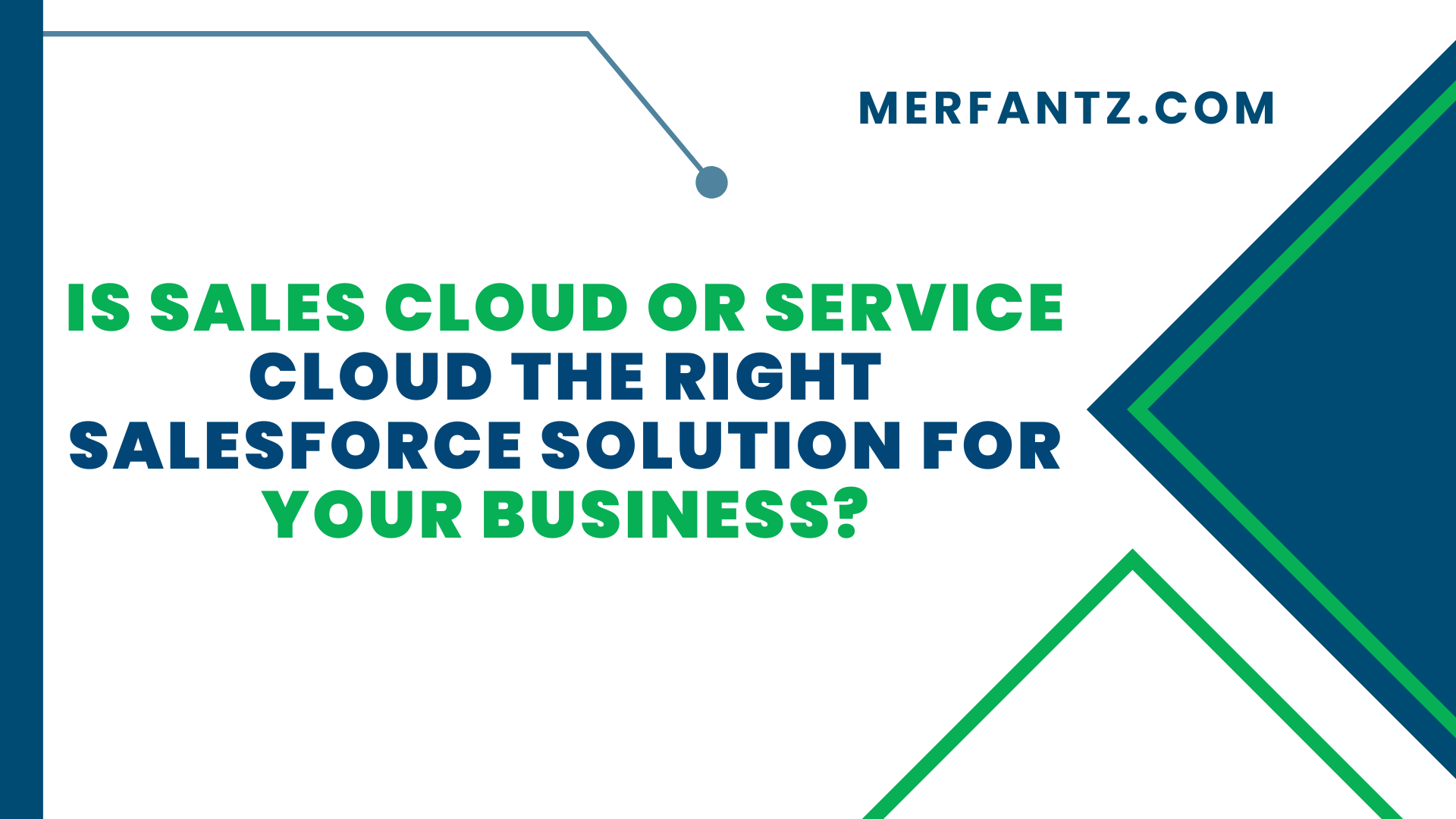Introduction to Salesforce Solutions
Salesforce is a powerful customer relationship management (CRM) platform that offers a range of solutions to cater to diverse business needs. Two of the most popular options within the Salesforce ecosystem are Sales Cloud and Service Cloud. These solutions are designed to streamline various aspects of your business operations, but they serve distinct purposes. In this blog post, we’ll explore the differences between Sales Cloud and Service Cloud to help you make an informed decision about which one is the right fit for your business.
At Merfantz Technologies, we understand the importance of selecting the correct Salesforce solution to maximize your efficiency, productivity, and customer satisfaction. Whether you’re focused on sales, customer support, or both, our experts are here to guide you through the decision-making process. Let’s delve into the specifics of Sales Cloud and Service Cloud to determine which one aligns better with your organization’s unique requirements.
Understanding the Sales Cloud
Salesforce Sales Cloud is tailored for businesses primarily involved in sales and lead generation. It offers a comprehensive suite of tools and features to manage your sales pipeline, automate tasks, and boost your sales team’s productivity. With Sales Cloud, you can track leads, opportunities, and customer interactions, ultimately driving revenue growth.
Merfantz Technologies specializes in Salesforce development, and we’ve helped numerous clients harness the power of Sales Cloud to drive their sales processes. From lead nurturing to creating personalized customer journeys, we’ll show you how Sales Cloud can be customized to suit your business’s unique sales objectives.
Exploring the Service Cloud
Salesforce Service Cloud, on the other hand, is designed to enhance customer support and service management. It empowers your support teams to provide excellent customer experiences by centralizing case management, enabling self-service options, and ensuring timely issue resolution.
Merfantz Technologies has a proven track record of implementing Service Cloud solutions that transform customer support operations. We’ll guide you through the various features of Service Cloud and help you leverage its capabilities to create a seamless and efficient support ecosystem for your customers.
Key Features of Sales Cloud
Sales Cloud offers an array of features, including robust sales automation tools that help streamline repetitive tasks, enabling your sales team to focus on building relationships and closing deals. It also provides insightful analytics and reporting to track your team’s performance and make data-driven decisions.
Contact and lead management are at the heart of Sales Cloud, allowing you to organize and prioritize your sales efforts effectively. With Merfantz Technologies as your partner, you can harness these features to optimize your sales processes and achieve your revenue targets.
Sales Automation Tools
Sales automation is a game-changer for businesses looking to scale their operations. Salesforce Sales Cloud offers automation of routine tasks, such as data entry, email communication, and follow-up reminders. This ensures that your sales team can focus on building relationships and closing deals rather than getting bogged down by administrative work.
At Merfantz Technologies, we’ll work closely with you to implement sales automation workflows tailored to your specific needs. Our Salesforce development expertise ensures that you get the most out of Sales Cloud’s automation capabilities.
Contact and Lead Management
Effective contact and lead management are essential for nurturing potential customers and converting them into loyal clients. Sales Cloud provides tools for capturing, organizing, and tracking leads and contacts, making it easier to target the right audience with the right message.
Merfantz Technologies will help you optimize your contact and lead management processes within Sales Cloud, ensuring that you have a clear and organized view of your prospects, enabling you to engage with them more effectively.
Key Features of Service Cloud
Service Cloud is packed with features geared towards providing exceptional customer support. One of its key strengths lies in its ability to centralize case management. This means that your support agents can efficiently handle customer inquiries, issues, and requests all in one place, resulting in faster response times and improved customer satisfaction.
Merfantz Technologies has the expertise to help you harness the power of Service Cloud’s case management features. We’ll work with your team to create a streamlined process that ensures every customer query is addressed promptly and effectively.
Customer Support and Case Management
Excellent customer support is a competitive advantage in today’s business landscape. Service Cloud equips your support teams with the tools they need to provide top-notch assistance. It includes features like multi-channel support, automated case routing, and a knowledge base to empower customers to find answers to their queries independently.
At Merfantz Technologies, we understand the importance of delivering exceptional customer service. We’ll help you implement Service Cloud’s customer support and case management features to create a seamless and responsive support system that delights your customers.
Knowledge Base and Self-Service Options
Self-service is becoming increasingly crucial for modern businesses. Service Cloud allows you to build a comprehensive knowledge base that empowers customers to find solutions to their problems independently. This not only reduces the workload on your support agents but also enhances the overall customer experience.
Merfantz Technologies will guide you through the process of setting up a knowledge base and self-service options within Service Cloud, ensuring that your customers have easy access to the information they need, 24/7.
Choosing the Right Solution for Your Business
When it comes to selecting between Sales Cloud and Service Cloud, the decision should align with your organization’s unique goals and requirements. Both solutions offer powerful capabilities, but their focus areas differ. At Merfantz Technologies, our Salesforce development experts will conduct a thorough analysis of your business processes, objectives, and challenges to recommend the solution that best suits your needs.
In conclusion, choosing the right Salesforce solution is a critical step in optimizing your business operations. Whether it’s Sales Cloud to drive revenue growth or Service Cloud to enhance customer support, Merfantz Technologies is your trusted partner for Salesforce development and implementation. Contact us today to embark on your journey towards Salesforce success.
FAQ
How do I decide between Sales Cloud and Service Cloud for my business?
The decision between Sales Cloud and Service Cloud depends on your business’s primary focus and goals. If your main objective is to boost sales, manage leads, and automate sales processes, Sales Cloud is the right choice. On the other hand, if you prioritize delivering exceptional customer support and need tools for efficient case management and self-service options, Service Cloud is the way to go.
Can I use both Sales Cloud and Service Cloud in my organization?
Yes, many organizations use both Sales Cloud and Service Cloud to cover their sales and customer support needs comprehensively. Salesforce offers seamless integration between the two solutions, allowing you to create a unified CRM ecosystem.
How can Merfantz Technologies help with Salesforce development?
Merfantz Technologies specializes in Salesforce development and customization. Our experienced team can assess your business requirements, recommend the most suitable Salesforce solutions, and tailor them to fit your specific needs. We offer end-to-end services, from initial consultation to implementation and ongoing support.
What is the difference between Salesforce Service Cloud and Sales Cloud?
Salesforce Service Cloud and Sales Cloud are two distinct solutions within the Salesforce ecosystem:
- Salesforce Sales Cloud: This solution is primarily designed to streamline sales processes. It includes features for lead management, opportunity tracking, sales automation, analytics, and reporting. Sales Cloud is ideal for organizations focused on growing their sales revenue and managing customer relationships throughout the sales cycle.
- Salesforce Service Cloud: Service Cloud, on the other hand, is geared towards enhancing customer support and service management. It offers tools for case management, multi-channel support, knowledge base creation, and self-service options. Service Cloud is the choice for businesses aiming to provide exceptional customer service and efficiently resolve customer inquiries and issues.
Which cloud is most used in Salesforce?
Both Salesforce Service Cloud and Sales Cloud are widely used within the Salesforce customer base. The choice between them depends on an organization’s specific needs and priorities. Therefore, there isn’t a definitive answer as to which cloud is most used, as it varies from one company to another.
What is the best use of Salesforce Sales Cloud?
Salesforce Sales Cloud is best suited for businesses that want to:
- Improve sales productivity: Sales Cloud provides automation tools that reduce manual tasks, allowing sales teams to focus on selling.
- Manage leads and opportunities: It offers robust lead and opportunity management features, enabling organizations to track and nurture potential customers effectively.
- Gain insights: Sales Cloud’s analytics and reporting capabilities help businesses make data-driven decisions, optimize sales strategies, and forecast sales accurately.
- Enhance customer relationships: By centralizing customer information, Sales Cloud ensures that sales teams have a complete view of customer interactions, enabling them to provide personalized service.
Why choose Salesforce Service Cloud?
There are several compelling reasons to choose Salesforce Service Cloud:
- Exceptional customer support: Service Cloud empowers organizations to deliver top-notch customer service by centralizing case management, providing multi-channel support, and enabling timely issue resolution.
- Efficient self-service: It includes tools for building knowledge bases and self-service portals, allowing customers to find answers to their questions independently, reducing support ticket volumes.
- Improved agent productivity: Service Cloud’s automation and routing capabilities streamline support processes, enabling support agents to handle customer inquiries more efficiently.
- Enhanced customer satisfaction: By providing quick and effective support, Service Cloud helps organizations create positive customer experiences, leading to increased loyalty and customer retention.
- Data-driven insights: Service Cloud offers robust reporting and analytics, allowing businesses to monitor support performance, identify trends, and continuously improve their support operations.
Ultimately, the choice between Salesforce Service Cloud and Sales Cloud depends on your organization’s primary objectives, whether it’s sales growth or exceptional customer support. Many companies even choose to integrate both clouds to create a comprehensive CRM solution that covers both sales and service needs.
Conclusion
In conclusion, the choice between Sales Cloud and Service Cloud hinges on your organization’s unique priorities. Sales Cloud is ideal for businesses looking to enhance their sales processes, while Service Cloud excels in delivering top-notch customer support. At Merfantz Technologies, we’re committed to helping you make the right choice and optimizing your Salesforce implementation to drive success in your business. Contact us today to embark on your Salesforce journey and unlock the full potential of your CRM solution. Whether it’s Sales Cloud, Service Cloud, or a combination of both, we’ve got you covered.
Author Bio
Co-Founder & CMO at Merfantz Technologies Pvt Ltd | Marketing Manager for FieldAx Field Service Software | Salesforce All-Star Ranger and Community Contributor | Salesforce Content Creation for Knowledge Sharing






